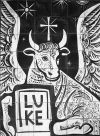
The Gospel of Luke
Towards Jerusalem: Lk 9,51-19,44
The journey to Jerusalem of Jesus with his disciples in this Gospel covers a full ten chapters, 9,51 to 19,44. In the Acts of the Apostles, it is Paul's missionary journeys which will be prominent. It's possible therefore for us to see journey of Jesus is a precursor of those later journeys, a prototypical missionary journey as it were. The evangelists are not simply recounting past events, they are reflecting back into the Gospels the situations of their own times. The missionary interest of Luke will become clear in the first episode.
The journey begins with the formal statement of departure in 9,51 and ends with Jesus on the Mount of Olives approaching Jerusalem (19,28-44) and then entering the Temple in 19,45.
It's noticeable how most references to the journey are at the beginning or the end of the journey. There are just a few references during the journey itself. Only at the end of chapter 18 when Jesus arrives in Jericho does his location become specific. It could be said therefore that the journey is the background motif for Jesus' teaching.
The Journey begins: Lk 9,51-62
10,1 begins with "after this" and the sending out of the 70.
These first few verses of the journey (9,52-62) set the scene therefore, providing the conditions for following Jesus on the journey.
9,51 picks up the exodus theme found in 9,31 during the Transfiguation scene. There are echoes here of Elijah going up to heaven in the whirlwind (2 Kings 2,1). "Setting his face" is a phrase used several times by the prophet Ezekiel. Noteworthy here is the Son of Man setting his face toward Jerusalem (Ezk 21,2).
In the book of Exodus, Moses sent out messengers before him (Ex 23,20), as Jesus now does.
Yet at once the messengers meet opposition as will be characteristic of all missionary journeys. The disciples' suggestion of calling down "Fire from heaven" (9,54) echoes Elijah's treatment of the king's messengers (2 Kings 1,10). It is perhaps surprising that the call came from James and John because they were privledged disciples (9,28) and therefore we might have expected them to have had a better understanding of Jesus.
The three statements by Jesus which follow (9,57-62) are an echo of the threefold commission by Elijah to Elisha, 2 Kings 2,1-6. It was Elisha who was ploughing when Elijah called him (1 Kings 19,19-21). In Matthew (Mt 18,18-22) the question is raised by a scribe. In Luke the questioner is not specified, appropriately for the missionary setting. The commitment to proclaiming the kingdom of God is absolute.
"Turning a hand to the plough" and "fit for the kingdom of God" in 9,62 are phrases which are unique to Luke. He is stressing the commitment required of a disciple and missionary. This is the last verse of the chapter. Chapter 10 opens with a new beginning in 10,1.
Back now to the main page and we will then move on to see Luke exploring the missionary theme further.
